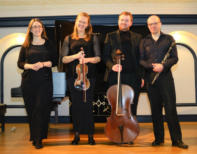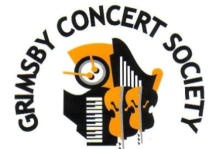


Ensemble Mirage
- Piano, Clarinet, Violin, Cello
13th March 2025
In
a
variation
to
the
usual
recital
format,
following
a
Sonata
by
Walter
Rabl,
the
audience
were
treated
to
an
introduction
to
Olivier
Messiaen’s
Quartet
for
the
End
of
Time.
Performing
were:
Matthew
Scott,
Clarinet;
Alexandra
Lomeiko,
violin,
Mike
Newman,
cello;
Alexandra
Vaduva,
piano - a wonderful combination of instruments, in the hands of four very talented musicians.
Rabl’s
Quartet
for
Piano,
Clarinet,
Violin
and
Cello:
a
romantic
piece
in
four
movements
full
of
contrast,
showcased
the
qualities
of
Ensemble
Mirage.
One
was
immediately
charmed
by
the
warmth
of
the
opening
allegro
and
the
excellence
of
the
ensemble
–
the
togetherness
of
the
musicians
and
the
perfect
balance
between
the
instruments,
underpinned
by
the
piano
playing
of
Alexandra
Vaduva.
From
Matthew
Scott
we
heard
wonderful
warm
clarinet
tones;
Mike
Newman’s
c.1840
French
cello
was
subtly
rich
and
stirring;
whilst
Alexandra
Lomeiko’s
Italian
violin
c.1850
was
sweet
and
smooth.
Rabl’s
quartet
revealed
a
relatively
unknown
but
delightful
romantic
composer.
The
piece
also
showed
how
well
the
instruments
worked
together
whilst
each voice remained clearly discernible.
Drawing
from
Messiaen’s
own
explanatory
notes
and
supported
by
the
ensemble
playing
excerpts
from
the
music,
Matthew
introduced
Messiaen’s
life-
affirming
quartet
-
creating
signposts
for
the
actual
full
performance
that
followed.
This
gave
an
insight
into
both
the
mind
of
the
composer
and
the
piece
that
an
audience
rarely
gets
to
enjoy;
learning
in
particular
the
influence
of
bird-song
in
Messiaen’s
music
and
of
his
synaesthesia
–
whereby
sounds
would
stimulate
the
perception
of
colours.
Afterwards
a
number
of
people
commented
how
this
had
enhanced
their
experience,
how
they
had
been
unsure if they would enjoy such a modern piece, and how the introduction had brought it to life for them.
84
years
on
from
the
first
performance
in
a
bitterly
cold
German
prisoner
of
war
camp,
time
was
suspended
for
Quatuor
pour
la
fin
du
temps
-
performed
by
Ensemble
Mirage
in
the
wonderful
setting
of
the
Assembly
Room
at
Grimsby
Town
Hall.
One
could
imagine
being
in
a
forest
just
before
dawn
–
the
darkness
gradually
dissipating
as
birds
sang,
intimated
by
the
violin
and
clarinet.
Featuring
piano,
violin
and
cello,
the
second
movement
provided
a
dramatic
shift
of
mood
and
changing
tensions.
In
a
third
movement
full
of
reminiscences,
Matthew
provided
a
seemingly
improvised
yet
in
reality
a
well-crafted
unaccompanied
clarinet
solo.
The
scherzo-like
fourth
movement
for
clarinet,
violin
and
cello
suggesting
forced
happiness
against
an
ominous
unspoken
threat.
The
fifth
movement,
with
a
delicate
piano
background,
featured
Mike
in
a
wonderful
drawn
out
cello
line,
serene
and
prayer
like,
closing
with
a
superbly
sustained
final
note
of
indeterminate
length.
A
strongly
rhythmic
sixth
movement
was
interspersed
with
moments
of
calm.
All
four
players
combined
in
“full
force”
for
the
seventh
movement
ending
in
a
‘devilish’
flourish.
Clearly
enjoying
the
meditative
ending
of
the
final
movement,
Alexandra
Lomeiko provided a thoughtful violin solo against a gentle discordant yet tuneful piano part, slowly climbing to a high ethereal E-harmonic.
IM
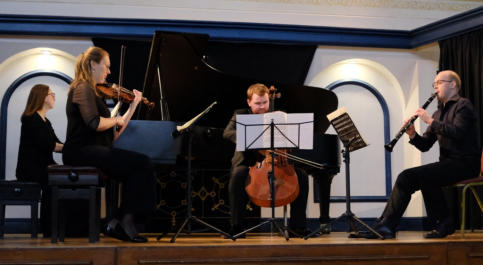
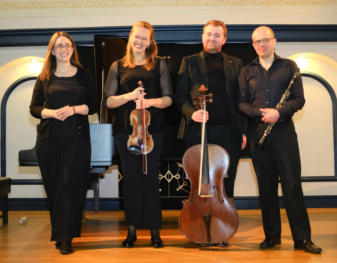
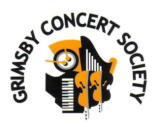


Ensemble Mirage
- Piano, Clarinet, Violin, Cello
13th March 2025
In a variation to the usual recital format,
following a Sonata by Walter Rabl, the
audience were treated to an introduction to
Olivier Messiaen’s Quartet for the End of
Time. Performing were: Matthew Scott,
Clarinet; Alexandra Lomeiko, violin, Mike
Newman, cello; Alexandra Vaduva, piano - a
wonderful combination of instruments, in the
hands of four very talented musicians. Rabl’s
Quartet for Piano, Clarinet, Violin and Cello:
a romantic piece in four movements full of contrast, showcased the qualities of
Ensemble Mirage. One was immediately charmed by the warmth of the opening
allegro and the excellence of the ensemble – the togetherness of the musicians
and the perfect balance between the instruments, underpinned by the piano
playing of Alexandra Vaduva. From Matthew Scott we heard wonderful warm
clarinet tones; Mike Newman’s c.1840 French cello was subtly rich and stirring;
whilst Alexandra Lomeiko’s Italian violin c.1850 was sweet and smooth. Rabl’s
quartet revealed a relatively unknown but delightful romantic composer. The piece
also showed how well the instruments worked together whilst each voice remained
clearly discernible.
Drawing from Messiaen’s own explanatory notes and supported by the ensemble
playing excerpts from the music, Matthew introduced Messiaen’s life-affirming
quartet - creating signposts for the actual full performance that followed. This gave
an insight into both the mind of the composer and the piece that an audience rarely
gets to enjoy; learning in particular the influence of bird-song in Messiaen’s music
and of his synaesthesia – whereby sounds would stimulate the perception of
colours. Afterwards a number of people commented how this had enhanced their
experience, how they had been unsure if they would enjoy such a modern piece,
and how the introduction had brought it to life for them. 84 years on from the first
performance in a bitterly cold German prisoner of war camp, time was suspended
for Quatuor pour la fin du temps - performed by Ensemble Mirage in the wonderful
setting of the Assembly Room at Grimsby Town Hall. One could imagine being in a
forest just before dawn – the darkness gradually dissipating as birds sang,
intimated by the violin and clarinet. Featuring piano, violin and cello, the second
movement provided a dramatic shift of mood and changing tensions. In a third
movement full of reminiscences, Matthew provided a seemingly improvised yet in
reality a well-crafted unaccompanied clarinet solo. The scherzo-like fourth
movement for clarinet, violin and cello suggesting forced happiness against an
ominous unspoken threat. The fifth movement, with a delicate piano background,
featured Mike in a wonderful drawn out cello line, serene and prayer like, closing
with a superbly sustained final note of indeterminate length. A strongly rhythmic
sixth movement was interspersed with moments of calm. All four players combined
in “full force” for the seventh movement ending in a ‘devilish’ flourish. Clearly
enjoying the meditative ending of the final movement, Alexandra Lomeiko provided
a thoughtful violin solo against a gentle discordant yet tuneful piano part, slowly
climbing to a high ethereal E-harmonic. IM
